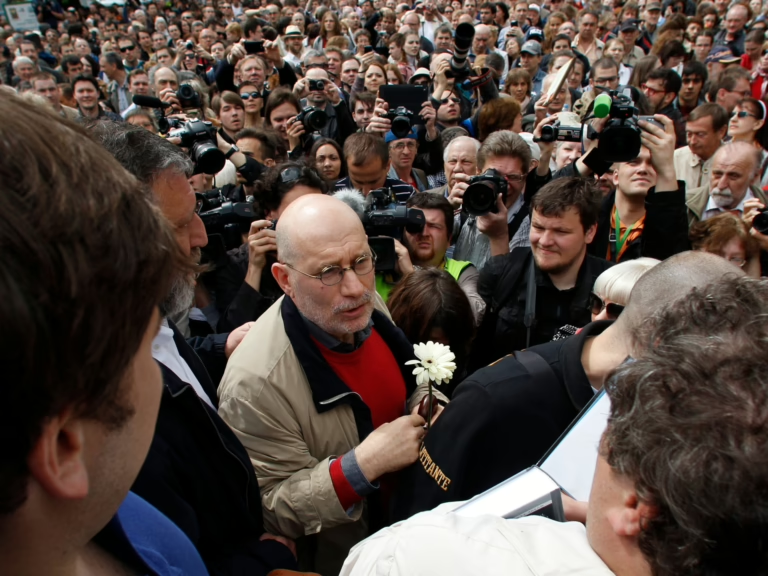Boris Akunin stands as one of Russia’s most acclaimed writers, renowned for his historical detective series featuring Erast Fandorin, which has been transformed into both films and television miniseries. Despite his literary success, Akunin has been labeled a “foreign agent” by Russian authorities, marking him as an adversary of the state.
Born Grigory Chkhartishvili, Akunin has been a vocal critic of President Vladimir Putin’s military actions in Ukraine.
“Being tagged as a ‘foreign agent’ is a minor issue compared to what I face,” Akunin shared with Al Jazeera from London. “There are already over a thousand individuals with this label. What truly matters is that a military tribunal sentenced me to 14 years for ‘justifying terrorism’-which, in reality, was my support for Ukraine’s right to self-defense-and I am now on an international wanted list.”
Before the enforcement of stricter regulations on September 1, bookstores and retailers across Russia had already begun removing Akunin’s works from their shelves.
While selling books by those designated as “foreign agents” is not explicitly illegal, a law enacted by Putin in April has created a chilling effect. Retailers now face potential fines and restrictions, including being barred from collaborating with libraries and public institutions.
This legislation prohibits individuals labeled as foreign agents from engaging in educational or political activities, receiving government support, or holding positions on state corporation boards.
Consequently, many bookstores have been systematically clearing out titles by blacklisted authors.
Artem Faustov, owner of the independent St Petersburg bookstore Vse Svobodny (“Everyone is Free”), noted the strong demand for these banned authors. “By the end of August, nearly all books by foreign agents were sold out,” he said. “We didn’t need to offer discounts. On August 31, we even extended our hours until midnight because customers kept coming. Now, we’re returning unsold copies to publishers.”
Unsold inventory that cannot be stored is often destroyed.
A Departure from Normalcy
These new restrictions represent the latest chapter in a growing wave of censorship engulfing Russia’s literary scene.
During the Soviet era, censorship was pervasive, with iconic works like Mikhail Bulgakov’s The Master and Margarita-which features the devil’s visit to 1930s Moscow-either heavily censored or banned outright. Although censorship eased after the Soviet Union’s collapse and was officially abolished in 1993 under the new constitution, it has been resurging under Putin’s rule.
In 2013, Russia introduced a law banning “LGBT propaganda,” a vague term that effectively prohibited positive or neutral portrayals of LGBTQ+ identities and relationships to minors. This law was broadened in 2022 to include adults, and the so-called “international LGBT movement” was declared an “extremist organization,” despite no formal entity existing under that name. Supporting this movement now carries the risk of imprisonment.
The recent amendments to education laws apply retroactively, allowing authorities to prosecute individuals for actions that were legal when originally undertaken.
In April, police raided the historic St Petersburg bookstore Podpisniye Izdaniya, searching for books containing “LGBT ideology” and feminist themes. The following month, three staff members from Eksmo and Individuum publishing houses were detained on charges of LGBT “extremism” related to the 2021 release of Pioneer Summer, a coming-of-age novel about a gay youth in the Soviet Union.
Felix Sandalov, former editor-in-chief of Individuum and now head of the overseas publisher StraightForward, explained, “This novel’s popularity led to new legal amendments targeting ‘LGBT propaganda.’ Now, even wearing a rainbow pin or selling a book featuring queer characters can be considered extremist behavior.”
Following a year-long investigation tracing connections from booksellers to alleged conspirators, the three publishing employees were arrested in a coordinated operation on May 15. They have since been added to lists of terrorists and extremists, with their bank accounts frozen.
“In a just society, such actions would only follow a court ruling-but clearly, we are far from that reality,” Sandalov remarked.
Forbidden Subjects
Since Russia’s full-scale invasion of Ukraine in 2022, wartime censorship laws have harshly penalized those who challenge the official narrative, including imprisonment.
Other prohibited topics include bans on “propaganda” promoting child-free lifestyles, comparisons between the Soviet regime and Nazi Germany, and references to an “international Satanism movement.”
Next year, a new law targeting “narco-propaganda”-the positive or neutral depiction of illegal drugs-will take effect.
Although lawmakers have assured that classic literature published before 1990 will be exempt, if Bulgakov’s works were released today, they might face bans again: The Master and Margarita for its satanic themes, and Morphine for its portrayal of opioid addiction.
Last year, the Russian Book Union established an expert panel, including representatives from the Orthodox Church and the internet regulator Roskomnadzor, to scrutinize books for prohibited content.
Beyond official bodies, vigilant citizens, such as members of the Russian Community group, frequently report “immoral” or “unpatriotic” materials to authorities.
“It’s impossible to manually review the vast number of books on the market,” Sandalov noted. “Fortunately for the censors, thousands of volunteers eagerly report suspicious content. Additionally, publishers have begun employing artificial intelligence to detect illegal material.”
“The leading publisher uses the Chinese AI system Qwen. While it struggles with context, it can efficiently analyze enormous volumes of titles.”
Sandalov revealed this development in his newsletter, Papercuts.
Self-censorship is also widespread, with publishers redacting sensitive passages much like classified documents. For instance, a biography of the gay Italian filmmaker Pier Paolo Pasolini has entire pages blacked out.
Nevertheless, authors and publishers have found creative ways to circumvent these restrictions, such as embedding controversial themes within science fiction or fantasy settings-like imagining a dystopian version of Russia-or by printing works abroad.
An alternative publishing network has emerged among the opposition diaspora, free from the constraints imposed within Russia. Sandalov’s StraightForward is part of this movement.
“In the 1920s, Russian émigrés established over a hundred publishing houses in Berlin,” he explained. “Most lasted less than a decade, but those that endured left a lasting legacy, contributing to tamizdat-dissident literature circulated outside the USSR. This historical parallel feels especially relevant today as Russia becomes increasingly isolated.”
For Akunin, who also publishes internationally through his BAbook imprint, the situation inside Russia remains bleak.
“Dictatorship and freedom of expression cannot coexist,” he stated. “The more authoritarian a regime grows, the more restrictions it imposes. Democracy means ‘everything not forbidden is allowed’; totalitarianism means ‘everything not allowed is forbidden.’ Russia’s shift from one to the other is nearly complete.”

















